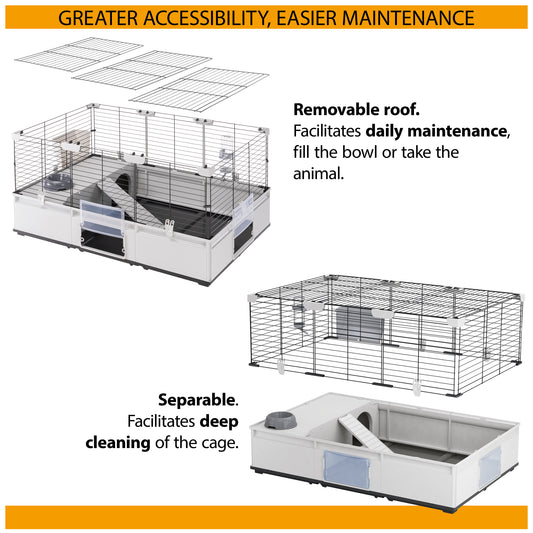How to help your cat live longer
The average life expectancy of a cat is around 13-14 years, although it is not uncommon for them to reach 18-20 years of age. A good innings for a cat is still a mere fraction of our own lifetimes, which is why we’re going to share the secrets of longevity with you. This is how to help your pet live as long and as healthy a life as possible.
A weighty issue
If your cat is obese their life expectancy drops to an average of five to 10 years so one of the best ways to help your cat live longer is to watch their weight. Cats that are overweight are far more likely to develop medical conditions such as diabetes, arthritis and liver problems due to the added strain on their joints and organs.
If you think your cat might be carrying a few extra pounds get them checked over by your vet who will weigh them and assess their body condition. If they need to lose weight your vet will be able to recommend the best way to do this and will invite your pet back for regular weigh-ins. Many vet surgeries have their own weight-loss clinics where you can take your pet to be weighed weekly while receiving advice and support.
Visit the vet
Regular check-ups are a good way for your vet to spot any early signs of illness and many life-threatening conditions can be identified and treated before they become a problem.
Cats are experts at hiding signs of pain and discomfort. While this is a useful survival mechanism it means that a pet owner will often not realise that their cat is suffering until it is too late. As well as picking up early warning signs, regular vet checks will ensure your pet is adequately protected through vaccinations and parasite control.
Keep your cat in
This is a tricky one as there is no doubt that indoors cats are much safer than those allowed to roam the neighbourhood. According to PetPlan, 230,000 cats are hit by cars every year and it’s not just busy roads that pose a hazard. Other animals, disease-carrying pests and unfriendly humans are all potential threats to an outdoors cat – but is an indoors cat necessarily a happy cat?
A cat that has previously been allowed access to the great outdoors will be much less happy suddenly being kept in than one who has only known life inside. It is also very important to make sure that an indoor cat gets everything they need to enjoy normal feline behaviour – such as climbing and pouncing – inside the home. If not, they can easily become stressed or depressed.
It is generally considered a good idea to keep all cats in at night as this is when they are at even greater risk of being involved in road accidents, fights with neighbouring cats or clashes with nocturnal wildlife. By keeping your outdoors cat in when it gets dark, they will definitely be safer.
Brain games
As well as physical exercise, cats also need to give their brains a workout in order to keep them young at heart and to prevent stress. Interactive play helps cats to exhibit their natural hunting instincts – such as climbing, pouncing, scratching and chasing – which in turn helps to tire them out.
Check your cat’s litter
Cats prefer using a nice clean litter tray so it’s important that you clean your cat’s toilet thoroughly every day. This daily check through your cat’s litter is also a good opportunity to look for any signs of ill health.
If you notice any changes in your cat’s toileting habits, or if they have diarrhoea or you spot any blood, you should get them checked over by your vet as soon as possible to identify any health issues early.
Brush up on grooming
Grooming isn’t just about making your pet look neat and tidy, it’s an important part of keeping their coat and skin healthy too. Cats spend a lot of their time grooming themselves but that doesn’t mean they don’t appreciate a bit of help from you every now and again.
While you are brushing your cat, it is a good opportunity to give them a good check over and to feel for any lumps and bumps. Any changes to your cat’s coat could be an early indicator of a health problem so if you spot anything you’re not sure about, see your vet.
Dental hygiene
Poor dental hygiene can result in greater problems than just bad breath. Cats can develop painful abscesses or infections or lose teeth if early signs of dental disease are not spotted. As well as regular brushing at home, your cat should have their teeth checked by your vet every year so that any problems can be identified early and treated quickly. Untreated tooth decay or gum disease can lead to serious issues elsewhere in the body, such as heart and kidney problems.
If you enjoyed this article, you may be interested in:









